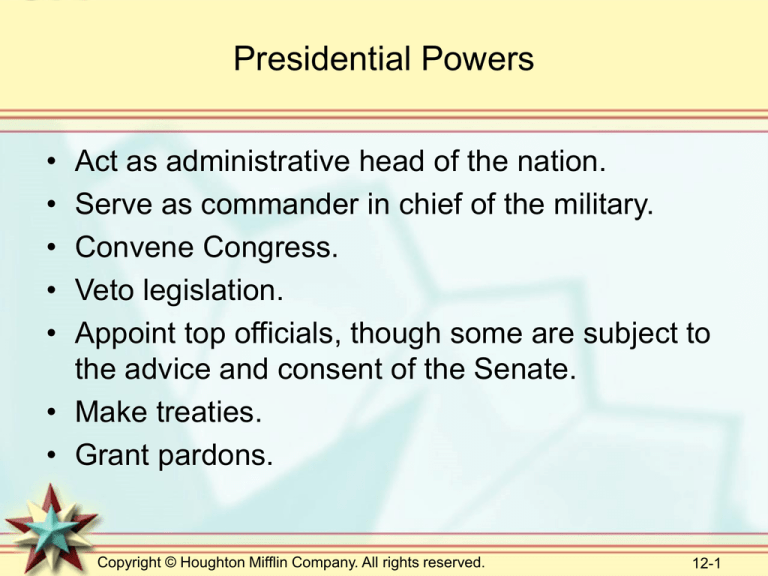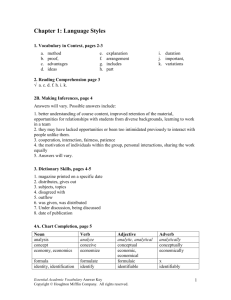
Presidential Powers
•
•
•
•
•
Act as administrative head of the nation.
Serve as commander in chief of the military.
Convene Congress.
Veto legislation.
Appoint top officials, though some are subject to
the advice and consent of the Senate.
• Make treaties.
• Grant pardons.
Copyright © Houghton Mifflin Company. All rights reserved.
12-1
The Expansion of Presidential Power
• The power of the modern presidency
comes not only from the explicit powers
listed in the Constitution but also from the
expansion of authority under claims of
inherent powers.
• Congress has also delegated power to
the executive branch.
Copyright © Houghton Mifflin Company. All rights reserved.
12-2
The Executive Branch Establishment
• One of the most important of the
president’s resources in office is his White
House staff.
• The Executive Office of the President
consists of the Chief of Staff, the
National Security Adviser, the Council
of Economic Advisers and the Office of
Management and Budget.
Copyright © Houghton Mifflin Company. All rights reserved.
12-3
The Executive Branch Establishment (Cont’d)
• Vice presidents have traditionally been
“standby equipment.” They are not usually
used in a major advisory capacity.
However, Al Gore was given a more public
role than usual, and Dick Cheney is also a
major force within the George W. Bush
administration.
Copyright © Houghton Mifflin Company. All rights reserved.
12-4
The Executive Branch Establishment (Cont’d)
• The cabinet is composed of the heads of
the major departments in the executive
branch and a small number of other key
officials such as the director of the Office
of Management and Budget.
• Modern presidents do not rely on the
cabinet to make policy because their
White House staffs, offer most of the
advisory support they need.
Copyright © Houghton Mifflin Company. All rights reserved.
12-5
Presidential Character (Cont’d)
• Personality characteristics clearly have an
important effect on presidents’ success or
failure in office. However, character is only
one of a number of factors that go into
making a successful president.
Copyright © Houghton Mifflin Company. All rights reserved.
12-6
Presidential Character (Cont’d)
• Presidents are in a better position to
persuade when their public popularity is
high.
• The president’s popularity and legislative
success also depend upon the wider
political environment and whether divided
government exists that produces
gridlock.
Copyright © Houghton Mifflin Company. All rights reserved.
12-7
Elections
• To win an election, a presidential
candidate must put together a winning
coalition with a minimum of 270 electoral
votes.
• Candidates who win the presidency claim
they have been given a mandate by the
voters, but such mandates tend to be
more rhetoric than reality.
Copyright © Houghton Mifflin Company. All rights reserved.
12-8
Elections (Cont’d)
• Presidential leadership is also shaped by the
president’s relationship to the dominant political
party and its policy agenda.
• According to political science scholars,
presidents will have a greater opportunity to
change policy when he is in the majority and the
opposing political party is perceived to be unable
to solve major national problems.
Copyright © Houghton Mifflin Company. All rights reserved.
12-9
Elections (Cont’d)
• Presidents who come to power right after
critical elections have the most favorable
environment for exerting strong
presidential leadership.
Copyright © Houghton Mifflin Company. All rights reserved.
12-10
The President as National Leader
• Presidents carry into office a broad
political vision that reflects their ideology
and priorities.
• The president’s central role in our political
system guarantees that he can always
command attention for his agenda.
Copyright © Houghton Mifflin Company. All rights reserved.
12-11
The President as World Leader
• For nearly forty years, the president’s priority as
world leader was to contain communism.
• American presidents are now entering a new era
in which there is more emphasis on managing
national security, fostering a peaceful
international environment, protecting U.S.
economic interests and promoting democracy
and humanitarian concerns throughout the
world.
Copyright © Houghton Mifflin Company. All rights reserved.
12-12

